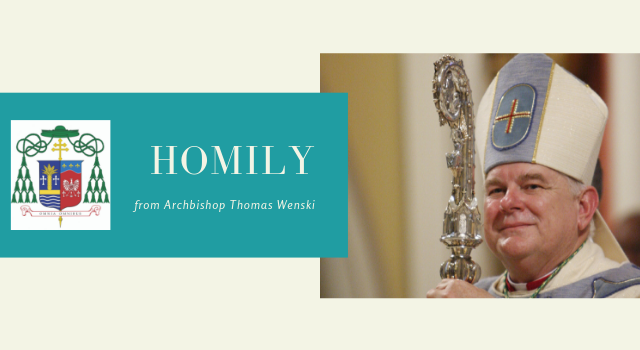By Archbishop Thomas Wenski - The Archdiocese of Miami
Archbishop Thomas Wenski preached this homily during the vigil Mass for the Fifth Sunday of Lent, which he celebrated March 25, 2023, at Epiphany Church in Miami.
Last Sunday, Jesus cured a man born blind and in doing so he showed himself to be the Light of the World. In today’s Gospel, he raises a dead man from the tomb. In raising Lazarus from the dead, he reveals himself to be the Lord of life. As he did for Lazarus, Jesus calls us out of our tombs. For the Christian, life only truly begins when we hear the Word of God and obey it.
As Lazarus was unbound from his shroud, so too we can be freed from the fetters of sin through Jesus’ Paschal victory over sin and death.
God did not create us just so that one day we would die. He made us for himself: to know, love and serve him in this life and to live with him for all eternity. Dying on the cross, he destroyed our death and in rising from the dead, he restores our life.
Of course, God normally doesn’t intervene to prevent the tragedies and sufferings of life as we make our way on our earthly pilgrimage, “mourning and weeping in this vale of tears.” Not knowing why bad things happen to good people can try our faith. Like Job, we want to know why; and God may one day tell us; but not necessarily on this side of eternity.
However, in Jesus, God is revealed as one who shares with us suffering, grief and death and in doing so, reminds us that our sufferings joined with his can be redemptive.
After the 2010 earthquake in Haiti, a tragedy that took perhaps as many as 300,000 lives, there is a story of a journalist who while surveying the death and destruction around him, asked “Where was God?” He said this standing near a destroyed church – everything had collapsed except a small shrine outside the church. In this shrine, a concrete crucifix still stood amid the rubble. An elderly woman who heard what the reporter had said looked at him and pointed to the crucifix and said, “Where was God? There was God.”
She shared the faith of Martha and believed what she believed when Jesus told her: “I am the Resurrection and the life; whoever believes in me, even if he dies, he will live; who lives and believes in me will never die.”
Where is God in the middle of human tragedies? God is there among us, weeping as Jesus did at the tomb of Lazarus. This is our God who stands in deep, human solidarity with us, and through the glory of the incarnation embraces fully our human condition.
This is faith – the faith of Martha, the faith of the Church. We are “Church” because we believe what Martha believed: “Yes, Lord, I believe that you are the Christ. You have the words of eternal life.” Faith leads us to trust Jesus and his word.
To say we believe is easy but to live out that belief in our daily life, especially when confronted by death, or by those mini deaths we face every day because of failures, crises, sickness, or other realities we experience in this “vale of tears,” is not so easy.
Yet, this story of the raising of Lazarus proclaims the great truth that Jesus is the Lord of life. He has the power to call us out of our tombs. Life begins for us when we, even though we are dead, hear the word of God and obey it. And we don’t have to be dead physically to be in need of being raised up. Jesus’ word calls us all – as he called Lazarus – away from making the tomb our natural habitat.
This is also a challenge for us to take responsibility for our brothers and sisters who, like Lazarus, are loved by Jesus. When Lazarus emerged from tomb, Jesus told those around to free him from his burial cloths. Likewise, as a community of faith strengthened by God’s word, we must help those dead and bound by sin to go free. As the community of Bethany played its part in helping Lazarus unwind and emerge into the light of his new life, we need to support those who will rise with Jesus to new life in the waters of baptism on Holy Saturday. And we certainly could encourage – gently, of course – some of our friends and family members to make a good confession in time for Easter.
They and we must continue to grow in our friendship with the Lord, who scatters the darkness of sin with the Light of Faith and calls us out of our tombs into the fullness of life.
The Gospel readings we have heard during these Sundays of Lent move in a kind of crescendo: from thirst, to blindness, to death. These are all metaphors for spiritual dysfunction. And today’s Gospel dealing with Lazarus’ death – and his being in the tomb already for four days – represents someone who is totally bound by sin, totally dead spiritually. Yet, the voice of Jesus calls him back to life – and he also calls us back to life, no matter what we’ve done, no matter how dead we might be. Death does not have to have the last word. No matter how difficult or painful our lives may be, there is always hope for new life and transformation through the power of Christ.
As St. Paul assures in today’s second reading: “The Spirit of the One who raised Jesus from the dead dwells in you.”

